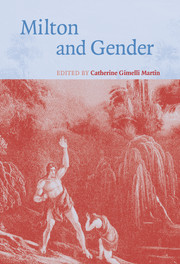Book contents
- Frontmatter
- Contents
- List of illustrations
- Notes on contributors
- Acknowledgments
- Abbreviations
- Introduction: Milton's gendered subjects
- PART I MASCULINITY, DIVORCE, AND MISOGYNY IN MILTON'S PROSE
- PART II THE GENDERED SUBJECTS OF MILTON'S MAJOR POEMS
- PART III GENDERED SUBJECTIVITY IN MILTON'S LITERARY HISTORY
- 11 George Eliot as a “Miltonist”: marriage and Milton in Middlemarch
- 12 Saying it with flowers: Jane Giraud's ecofeminist Paradise Lost (1846)
- 13 Woolf's allusion to Comus in The Voyage Out
- Index
11 - George Eliot as a “Miltonist”: marriage and Milton in Middlemarch
Published online by Cambridge University Press: 22 September 2009
- Frontmatter
- Contents
- List of illustrations
- Notes on contributors
- Acknowledgments
- Abbreviations
- Introduction: Milton's gendered subjects
- PART I MASCULINITY, DIVORCE, AND MISOGYNY IN MILTON'S PROSE
- PART II THE GENDERED SUBJECTS OF MILTON'S MAJOR POEMS
- PART III GENDERED SUBJECTIVITY IN MILTON'S LITERARY HISTORY
- 11 George Eliot as a “Miltonist”: marriage and Milton in Middlemarch
- 12 Saying it with flowers: Jane Giraud's ecofeminist Paradise Lost (1846)
- 13 Woolf's allusion to Comus in The Voyage Out
- Index
Summary
“The best history of a writer is contained in his writings – these are his chief actions.” This opinion is registered in a letter that George Eliot wrote in 1879, in response to a query whether there was to be a biography of her companion, George Henry Lewes, who had died the year before. “Biographies generally,” Eliot went on to remark, “are a disease of English literature.” In her book The Real Life of Mary Ann Evans, Rosemarie Bodenheimer has made these remarks a watchword for studying how Eliot's own writings reveal the inner structure of her life, one of the dynamics of which was a recurring “resistance” to indulging “requests for biographical information about herself.” These remarks also shed light upon the vexed subject of how George Eliot read another author who, although he resisted writing an autobiography, wrote a good deal about himself. By the mid nineteenth century John Milton was thoroughly entangled in a network of biographical speculation, and his name was likely to bring to mind popular narratives about a great poet's domestic experience. For her part, Eliot took an interest in the biographical implications of what Milton wrote and published. At times she also sought to disentangle those implications from stories that substituted fanciful speculation about his relations with women for first-hand encounters with his writing.
- Type
- Chapter
- Information
- Milton and Gender , pp. 207 - 222Publisher: Cambridge University PressPrint publication year: 2005
- 2
- Cited by

